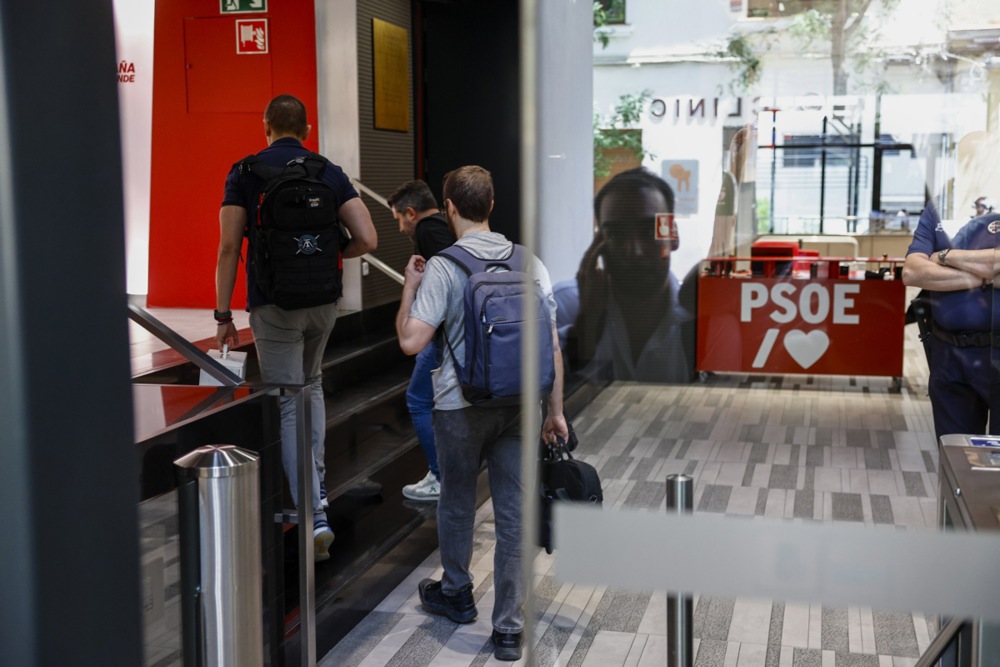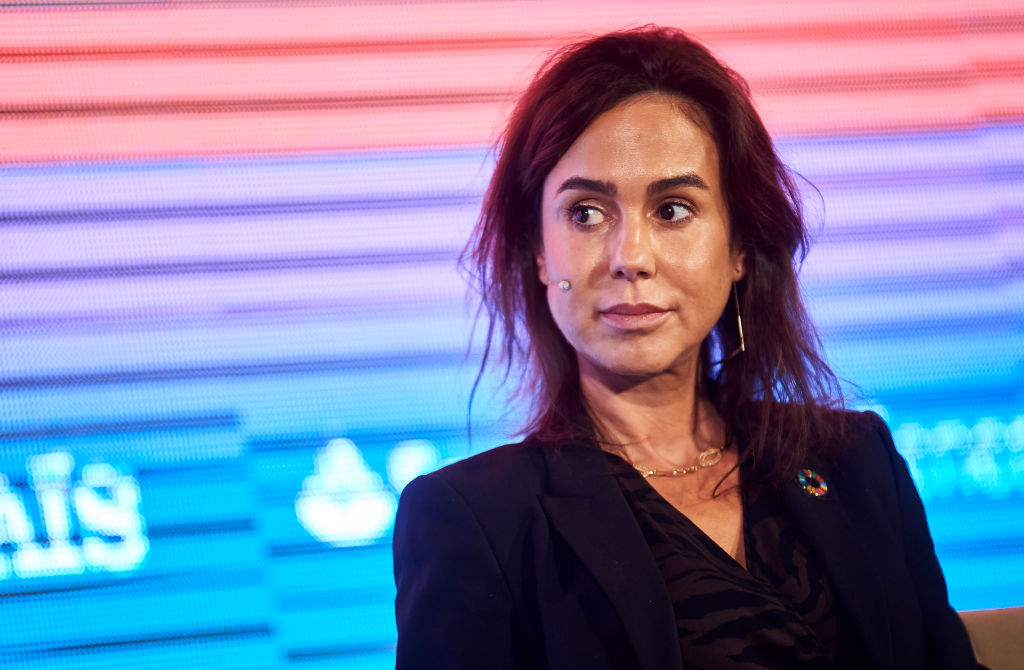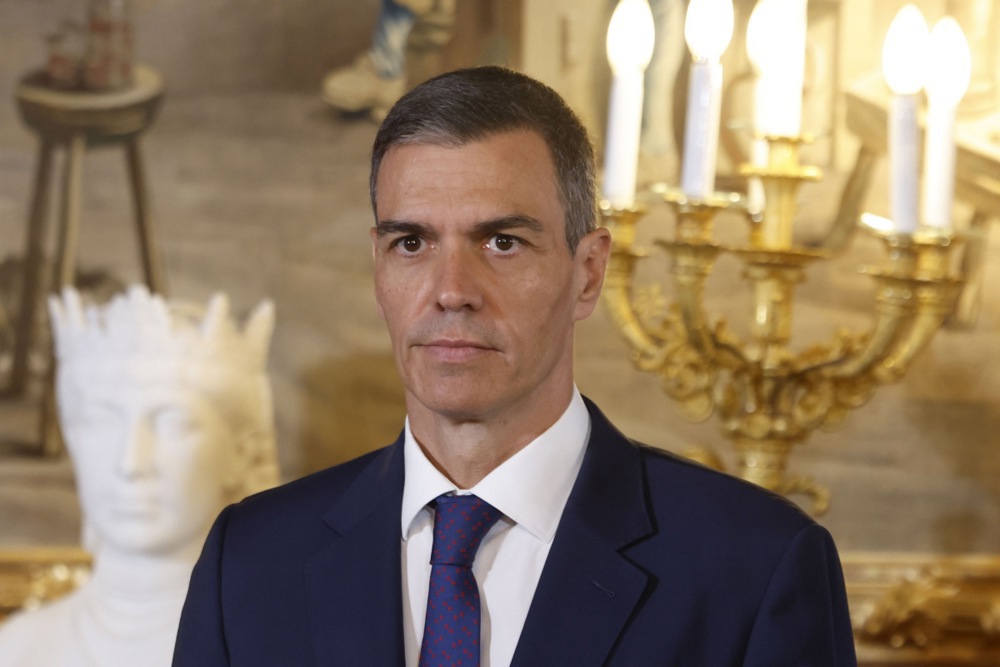Santos Cerdán, a former senior official of the Spanish Socialist Party (PSOE) and close assistant of current Prime Minister Pedro Sánchez, has been remanded in custody by Spain’s Supreme Court.
Cerdán is being held on charges of bribery, criminal organisation and influence peddling connected to the so-called Koldo case — a series of corruption scandals beginning with the Spanish government’s purchase of Covid-19 masks.
Each of the three charges for which Cerdán now faces trial can be punished with sentences of more than two years.
The investigating magistrate denied Cerdán’s right to bail, agreeing to a precautionary measure the Anti-Corruption Prosecutor’s Office requested.
The judge agreed with prosecutors there was a flight risk, and Cerdán could also attempt to destroy further incriminating evidence.
The case’s judge concluded there was sufficient evidence to ask whether Cerdán was the leader of a corruption plot, in which he worked together with Sánchez’s former advisor Koldo García Izaguirre, news outlet El Debate reported.
Koldo García served at the time as an advisor under then-transport minister José Luis Ábalos.
Conversations between Cerdán and Koldo, some of which have already appeared in the press “are explicit”, said the judge.
They showed “enormous incriminating evidence” suggesting the former advisor’s “decisive” role in the case, he added.
As well as Cerdán’s high flight-risk, the judge said his detention served an additional purpose because the amounts allegedly received by the ringleaders are “very substantial”.
They “could not be limited” to the sums mentioned in intercepted conversations recorded by anti-corruption investigators from Spain’s Central Operational Unit, he said.
Until June 12, Cerdán was still the secretary of Spain’s Socialist Party (PSOE), and a close confidant of PM Sánchez.
When appearing before the court on June 30, Cerdán was only willing to answer questions posed by his lawyer.
Cerdán has denied the criminal activities of which prosecutors accuse him.
He maintains he is the victim of “political persecution”, after his role in bringing Sánchez to power.
“They do not like a government like Sánchez’s, with no ties to the past,” Cerdán claimed. “Great progress has been made, it bothers these powers and drags us through the mud,” he added.
Cerdán insisted he was “innocent,” that he “hasn’t taken a single euro,” and that there was no illegal financing.
Cerdán said he had been in charge of negotiating the amnesty with the Catalonians, and this was the reason why justice minister Félix Bolaños had chosen to target him.
In turn, anti-corruption prosecutors heavily criticised Cerdán for his “offensive” claims he was victim of a politically motivated witch hunt.
Regarding the audiotapes which discussed illegal payments and prostitutes, Cerdan said he did not recognise the voice on the tapes as being his own, news outlet El Mundo reported.
After initially defending him, his party colleagues have now turned on Cerdán, saying he had “nothing to do with the PSOE”.
? María Jesús Montero, sobre la entrada en prisión de Santos Cerdán: «Es un asunto de una persona que no tiene qué ver con el PSOE». pic.twitter.com/OvZ9h73qLl
— THE OBJECTIVE (@TheObjective_es) June 30, 2025
Another key part of the investigation involved a contract making Cerdán owner of 45 per cent of Servinabar, a company which later secured public contracts.
Cerdán claimed he tore up the contract after signing it, having first discussed the matter with his wife.
He said he initially planned to leave politics, which is why he considered the deal. Eventually his wife convinced him not to go through with it.
Regarding his contacts with transport minister José Luis Ábalos (who is under investigation), and his apparent interest in certain public works projects, Cerdán explained he maintained interest in “many projects” because as the party’s secretary, his role was to connect local branches with the central government.
He says he acted as the liaison between the Socialist Party and the government on these matters.
Cerdán admitted involvement in Transport Ministry appointments after PSOE’s return to power, mentioning that former Transport Minister Pepe Blanco suggested names to him and Ábalos.
Ideological alignment in key roles is crucial for the party’s effectiveness, said Cerdán.
He denied that the Social Party had received any illegal financing.
The major corruption scandal rocking the progressive Spanish Government, the Koldo Case, has taken a lewd turn, with prostitutes and a porn actress joining the fray. https://t.co/qek0RWipyW
— Brussels Signal (@brusselssignal) June 19, 2025
In late 2019, Cerdán participated in early negotiations between the transport ministry and the Government of Navarra, leading to a €40 million direct state subsidy for the Belate and Almándoz tunnel project.
Although Cerdán held no official position in the regional government, he attended a high-level meeting at the ministry alongside regional officials, a move even official government statements at the time noted was unusual.
The project later saw €76 million awarded to a consortium including Acciona, Excavaciones Osés, and Servinabar.
Just weeks after the initial ministerial meeting, Servinabar dramatically shifted its registered business activity from event services to construction, thus positioning itself for public works tenders.
By early 2020, the regional government—led by María Chivite, a Socialist Party ally—launched the tender process.
Though Servinabar was too late to bid for the preliminary planning contract, it later reappeared in the main construction tender.
It ultimately won the contract as part of an Acciona-led consortium in early 2024, despite documented irregularities during the award process–including internal objections from the contracting secretary and auditor.
Businessman Víctor de Aldama, a key suspect in the corruption investigation, also attended meetings at the ministry without any formal role, further fuelling suspicions about influence peddling and illicit coordination.
Servinabar’s earlier success in bidding for a €7 million housing project in Navarra also drew scrutiny.
The EU financed one quarter of that amount via the European Investment Bank and European Next Generation EU funds within the Recovery Plan, Transformation and Resilience.
Interference podcast Episode 2. @ThatAlexWoman and @JustinStares are joined by Spanish MEP @hermanntertsch to talk about the prostitution scandal that has hit Spain's ruling coalition. pic.twitter.com/qrIzCG3ypj
— Brussels Signal (@brusselssignal) June 28, 2025





